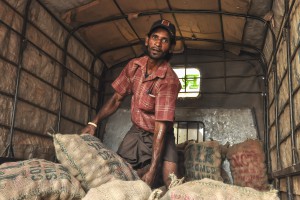Poverty, inequality and standards of living

The lack of social protection coverage, being associated with economic insecurity, poverty, high levels of inequality and low investments in human capital, is seen as a major obstacle to economic and social development. Social protection plays a critical role in reducing poverty and inequality, improving the standards of living and promoting social cohesion. Due to its fundamental role, social protection has become a key element of national strategies to promote human development, political stability and inclusive growth.
Photo credit: “Potatoe bags” by Brett Davies (CCBY 2.0 via Flickr).
Judicial Protection of the Right to Social Security
The right to social security is enshrined in the International Covenant on Economic, Social and Cultural Rights (ICESCR) as well as other international treaties, and has been upheld by numerous judicial bodies at the national, regional and international levels, both explicitly or implicitly through other rights including civil and political ones, and/or other constitutional and […]
A Rights-Based Approach to Social Protection: The Case of Tunisia
Tunisia today is at an important stage in its thinking about a new development model that combines optimal allocation of resources and social equity, welfare being an essential factor in the success of the democratic transition and at the core of the 2011 popular uprising. However, structural reform cannot be achieved in the absence of […]
COVID-19 Recovering Rights: Topic Seven | Income Support to Protect Rights
Main Takeaways Urgent measures are necessary to provide sufficient income to millions of people who cannot work due to pandemicrelated restrictions, so that they can still meet their basic needs. Many of these workers lack social and labor protections. Basic income schemes vary in type, design and implementation. Those that are universal, durable and unconditional […]
Public Good or Private Wealth? — Executive Summary
Our economy is broken, with hundreds of millions of people living in extreme poverty while huge rewards go to those at the very top. The number of billionaires has doubled since the financial crisis and their fortunes grow by $2.5bn a day, yet the super-rich and corporations are paying lower rates of tax than they […]
Public Good or Private Wealth?
Our economy is broken, with hundreds of millions of people living in extreme poverty while huge rewards go to those at the very top. The number of billionaires has doubled since the financial crisis and their fortunes grow by $2.5bn a day, yet the super-rich and corporations are paying lower rates of tax than they […]
Universal Basic Income
Universal basic income refers to unconditional cash transfers to everyone in a society regardless of their income, employment status, job search, or other key criteria. The concept differs from traditional forms of social protection, which tend to provide income support or services to people experiencing specific contingencies, i.e., due to unemployment, old age, disability, parenthood […]
Growth and Inequality in Pakistan (Volume I)
The theme of the book is Growth and Inequality. These are the two fundamental problems with the economy of the Pakistan. The rate of economic growth has barely touched 5 percent over the last decade. Simultaneously, the economic and social structure have perpetuated high income, wealth and regional disparities. Combined together, these two structural problems […]

